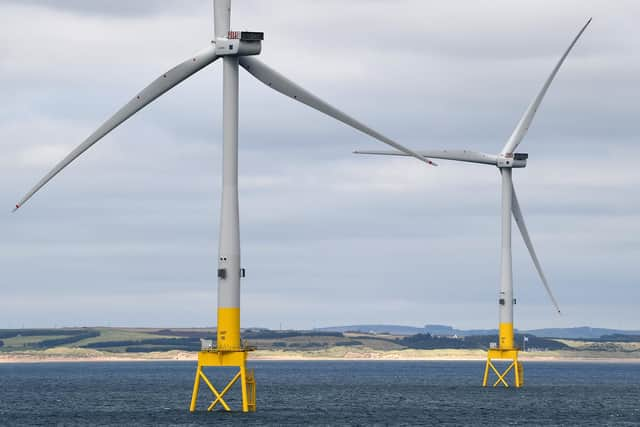Floating wind - unlocking the Scottish energy transition: Tom Glover comment
This is going to require a fundamental shift in society, with the transition of the Scottish economy to a low-carbon model and with the decarbonisation of the electricity system critical to its success.
RWE is one of the world’s leading renewables companies, one of the UK’s largest generators and already has 27 sites across Scotland across hydro, onshore wind, offshore wind and biomass technologies. We are a driver of the energy transition, with a target of becoming climate neutral by 2040 and are committed to helping enable Scotland to meet, and even exceed, its ambitions.
Advertisement
Hide AdAdvertisement
Hide AdThe Scottish energy industry has already developed a first-class reputation with unrivalled engineering skills and world-leading know-how. This has been based on innovation and technology developments, but above all the skills of its people, with Scottish accents heard on oil and gas platforms across the globe.


Those same attributes that enabled Aberdeen to become a global centre of excellence in the field of offshore oil and gas are exactly what must be harnessed to reposition the country, address these new challenges, and enable it to become a world-leader in renewable energy – a game-changing moment.
Scotland has for many years been a proving ground for renewable technologies, with the country being home to the world’s first tidal array and the first floating offshore wind farm. This spirit of innovation and engineering excellence, coupled with its deep-rooted engineering and manufacturing heritage, gives genuine confidence for the future.
However, despite Scotland being a natural location for large-scale renewable energy, it faces several challenges. The first is that despite high winds, the waters around Scotland are generally too deep for conventional offshore wind turbines, one of the cheapest technologies for delivering renewable energy.


The second is that to enable a proper transition to a low-carbon economy, there must be leadership in Scottish technology-development, industrialisation and commercialisation, as well as installation and operation.
The good news is that with the right support and investment, one technology can potentially address these two challenges. And that is floating offshore wind.
Having been considered an early-stage pioneering technology for some time, the floating wind industry now stands on the brink of evolving into a mainstream technology. Whilst there are fewer than 100 megawatts of floating wind currently installed globally, the rest of the 2020s will see gigawatts of capacity deployed around the world.
Floating wind uses the same turbines as conventional offshore wind turbines that are already in operation around the UK, but they are deployed on top of floating structures that are secured to the seabed with mooring lines and anchors. These floating structures and their associated infrastructure share many attributes with deep-sea offshore oil and gas platforms – hence providing the opportunity for Scotland’s existing expertise.
Advertisement
Hide AdAdvertisement
Hide AdTo date, the floating wind industry has been largely focused on research and innovation, proving that floating units can survive in harsh seas and that they will not be damaged by the additional motion of a floating structure.
RWE’s extensive experience in deploying offshore wind has given us an excellent understanding of what is needed to facilitate this new technology and we have been a driving force behind three demonstration projects around the world that have focused on these fundamental issues.
Value
All of this research and innovation has been immeasurably valuable. But the time has come to move past that stage and start making the transition from pioneering to industrialisation.
ScotWind represents a significant opportunity to deploy at ground-breaking commercial scale. If the Scottish industrial sector can grasp this opportunity and establish its position as an early sector leader, those companies at the forefront of floating wind will have a great opportunity to utilise their skills and experience in Scotland, and export good practice around the world.
At the heart of this must be prioritising the development of a local supply chain through close and meaningful collaboration between developers and suppliers – unlocking investments and creating value and opportunities through investment in local people and communities.
There are not many companies that can support the leap forward from pioneering technology to large-scale industrialisation and commercialisation. It needs large companies like RWE, with extensive know-how and expertise in offshore wind, with demonstrable experience of taking projects from concept to delivery and with a clear track record of delivering community benefits to those we ultimately serve.
In summary, with the support of major companies such as RWE in partnership with the Scottish Government, we can jointly capture the opportunity generated by the unrivalled engineering skills base located throughout Scotland, combined with the unique natural combination of high winds and deep seas to build a world-leading position in a new industry that will last for decades.
Tom Glover, RWE UK country chair
A message from the Editor:
Thank you for reading this article. We're more reliant on your support than ever as the shift in consumer habits brought about by coronavirus impacts our advertisers.
If you haven't already, please consider supporting our trusted, fact-checked journalism by taking out a digital subscription.
Comments
Want to join the conversation? Please or to comment on this article.
